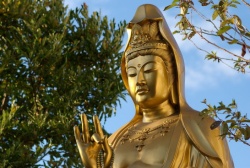Difference between revisions of "Nirvana School"
(Created page with "thumb|250px| <poem> Nirvana School (Niepanshi 涅槃師) The Nirvana School (Niepanshi 涅槃師) concentrates on the propagation of the nirvana theory ...") |
|||
| (One intermediate revision by the same user not shown) | |||
| Line 1: | Line 1: | ||
[[File:1546-hd.jpg|thumb|250px|]] | [[File:1546-hd.jpg|thumb|250px|]] | ||
<poem> | <poem> | ||
| − | Nirvana School (Niepanshi 涅槃師) | + | [[Nirvana School]] ([[Niepanshi]] [[涅槃師]]) |
| − | The Nirvana School (Niepanshi 涅槃師) concentrates on the propagation of the nirvana theory via the Nirvana Sutra in various translations and editions (the oldest translation was made by Faxian 法顯 and Buddhabadra "Fotuobatuoluo 佛陀跋陀羅": Daban nihuan jing 大般泥洹經, T 376). The larger edition is the Da niepan jing 大般涅槃經 by Dharmakśema ("Tanwuchen 曇無讖"; T 374). The corpus of the Nirvana School sutras is relatively small compared with the other schools. According to original Buddhist teaching, every being (dharma) has the Buddha-nature in itself (zhengyin foxing 政因佛性) and | + | The [[Nirvana School]] ([[Niepanshi]] [[涅槃師]]) [[concentrates]] on the [[propagation]] of the [[nirvana]] {{Wiki|theory}} via the [[Nirvana Sutra]] in various translations and editions (the oldest translation was made by [[Faxian]] [[法顯]] and [[Buddhabadra]] "[[Fotuobatuoluo]] [[佛陀跋陀羅]]": [[Daban nihuan jing]] [[大般泥洹經]], T 376). The larger edition is the [[Da niepan jing]] [[大般涅槃經]] by [[Dharmakśema]] ("[[Tanwuchen]] [[曇無讖]]"; T 374). The corpus of the [[Nirvana School]] [[sutras]] is relatively small compared with the other schools. According to original [[Buddhist teaching]], every {{Wiki|being}} ([[dharma]]) has the [[Buddha-nature]] in itself ([[zhengyin foxing]] [[政因佛性]]) and there with has the potential to {{Wiki|salvation}}, except so-called incorrigibles (Sanskr. [[icchantika]]; [[yichanti]] [[一闡提]]). {{Wiki|Adherents}} of the [[Nirvana]] school believed that even [[icchantikas]] are able to become a [[Buddha]]. [[Daosheng]] [[道生]] and [[Huiguan]] [[慧觀]] propagated this [[idea]] in southern [[China]]. In northern [[China]], [[Huisong]] [[慧嵩]] and [[Daolang]] [[道朗]] wrote comments and exegeses of [[Dharmakśema]] larger [[Nirvana Sutra]]. [[Nirvana School]] [[monks]] also taught the [[Fahua Sutra]] [[法華]] that also belongs to the final stage of the [[Buddha's]] sermons. There are different methods to show that the [[Buddha-nature]] is [[inherent]] in all [[sentient beings]]. [[Abhidharma]] |
</poem> | </poem> | ||
{{R}} | {{R}} | ||
Latest revision as of 04:23, 1 March 2014
Nirvana School (Niepanshi 涅槃師)
The Nirvana School (Niepanshi 涅槃師) concentrates on the propagation of the nirvana theory via the Nirvana Sutra in various translations and editions (the oldest translation was made by Faxian 法顯 and Buddhabadra "Fotuobatuoluo 佛陀跋陀羅": Daban nihuan jing 大般泥洹經, T 376). The larger edition is the Da niepan jing 大般涅槃經 by Dharmakśema ("Tanwuchen 曇無讖"; T 374). The corpus of the Nirvana School sutras is relatively small compared with the other schools. According to original Buddhist teaching, every being (dharma) has the Buddha-nature in itself (zhengyin foxing 政因佛性) and there with has the potential to salvation, except so-called incorrigibles (Sanskr. icchantika; yichanti 一闡提). Adherents of the Nirvana school believed that even icchantikas are able to become a Buddha. Daosheng 道生 and Huiguan 慧觀 propagated this idea in southern China. In northern China, Huisong 慧嵩 and Daolang 道朗 wrote comments and exegeses of Dharmakśema larger Nirvana Sutra. Nirvana School monks also taught the Fahua Sutra 法華 that also belongs to the final stage of the Buddha's sermons. There are different methods to show that the Buddha-nature is inherent in all sentient beings. Abhidharma
